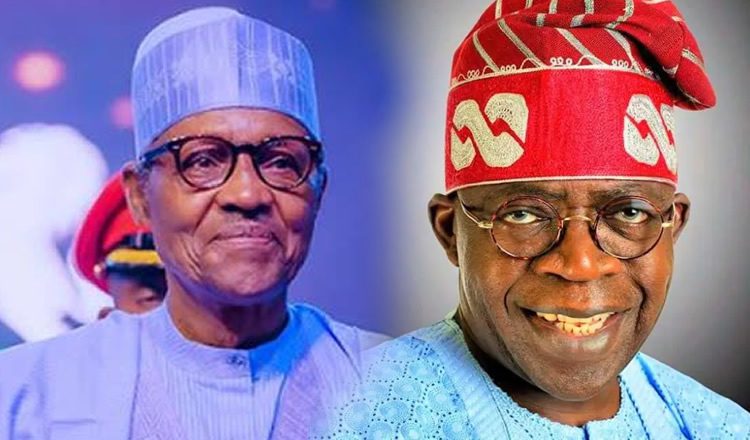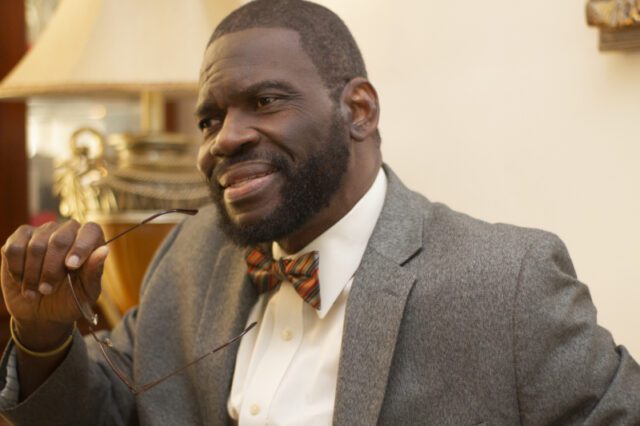National Issues
Transitioning the DSS: Therapeutic Strategies in the Shift from Buhari to Tinubu -By John Egbeazien Oshodi
The era under former President Buhari was characterized by a firm, often heavy-handed approach to governance, marked by authoritarian tendencies and the stifling of dissenting voices. During this period, the DSS frequently found itself embroiled in controversies, facing allegations of human rights violations and undue political influence. Nevertheless, with the dawn of Tinubu’s leadership, there emerges an opportunity for the DSS to pivot away from authoritarianism and towards a more transparent and accountable modus operandi.

Amidst Nigeria’s ever-evolving political landscape, the Department of State Services (DSS) stands at a critical crossroads. The transition from the authoritative governance of former President Muhammadu Buhari to the anticipated leadership of Asiwaju Bola Tinubu presents a unique set of challenges and opportunities for the agency. As the nation’s foremost domestic intelligence body, the DSS shoulders the responsibility of safeguarding national security while upholding democratic principles and human rights.
Originally conceived as a subdivision within the Nigerian Police Force (NPF) and Nigerian Security Organization (NSO), the DSS has historically played a pivotal role in ensuring the nation’s security. However, recent perceptions of the agency as ‘lawless’ have cast a shadow over its reputation, particularly in light of Nigeria’s gradual transition towards a more liberal and democratic governance under President Tinubu.
The era under former President Buhari was characterized by a firm, often heavy-handed approach to governance, marked by authoritarian tendencies and the stifling of dissenting voices. During this period, the DSS frequently found itself embroiled in controversies, facing allegations of human rights violations and undue political influence. Nevertheless, with the dawn of Tinubu’s leadership, there emerges an opportunity for the DSS to pivot away from authoritarianism and towards a more transparent and accountable modus operandi.

In the midst of Nigeria’s transition, the Department of State Services (DSS) confronts critical challenges that demand immediate attention. Recent revelations by Yoruba activist Sunday Igboho, who has returned home freely after three years, implicating former President Buhari in alleged attacks orchestrated by DSS operatives, underscore the urgent need for accountability and reform within the agency. Igboho’s bold accusations serve as a stark reminder of the imperative to restore public trust in security institutions and ensure their actions align with democratic values.
The DSS must respond to these allegations with utmost integrity, refraining from any attempts to harass or unlawfully detain Igboho. Such actions would not only risk sparking public outrage and calls for swift changes in leadership but also severely undermine the agency’s credibility, especially under the democratic leadership of Tinubu. Therefore, it is imperative for the DSS to address these human rights accusations promptly and transparently, demonstrating a steadfast commitment to accountability and respect for human rights.
Moreover, the DSS must swiftly and decisively address the disconcerting reports of potential involvement in recruiting thugs for violent disruptions during protests, especially when contrasted with the Nigeria Labour Congress (NLC) planning peaceful demonstrations. This situation demands immediate action to reassure Nigerians of the agency’s unwavering commitment to upholding the rule of law, respecting civil liberties, and safeguarding the integrity of peaceful protests.
Furthermore, the notion that peaceful protests should be prevented due to the possibility of criminal or hoodlum infiltration is untenable. It is the duty of law enforcement, including the police, to ensure the safety and security of all citizens during demonstrations. Seeking a court order to halt protests undermines democratic principles and citizens’ constitutional rights to peaceful assembly.
In navigating these multifaceted challenges, the DSS can benefit from the implementation of therapeutic strategies aimed at fostering institutional reform and cultural transformation. By embracing change and cultivating a culture of transparency, accountability, and respect for human rights, the DSS can realign itself with the democratic aspirations of the Nigerian people. As Nigeria transitions into a new era of governance under President Tinubu, the DSS must seize this opportune moment to redefine its role as a guardian of national security and a bastion of democratic ideals.
The reported failure of the Department of State Services (DSS) to return all seized items belonging to Nigerian civil rights activist Omoyele Sowore, who is preparing to travel back to the USA after the Buhari government and DSS held his passport for an extended period, reflects a troubling disregard for the rule of law and judicial directives. Despite explicit court orders mandating the release of Sowore’s confiscated belongings, including his phones and cash, the DSS’s refusal to comply undermines core principles of justice and legal standards. This defiance not only stains the reputation of the DSS as a law enforcement agency but also casts doubt on its dedication to preserving democratic principles and protecting the rights of citizens.
The reluctance of the DSS to abide by court orders further exacerbates existing tensions between authorities and activists, fueling skepticism about the government’s dedication to protecting human rights and ensuring accountability. It is imperative that the DSS prioritizes compliance with court directives, demonstrating its commitment to the rule of law and restoring trust in the justice system. By promptly returning all confiscated belongings to Sowore, including his phones and passport, and allowing him to travel back to the USA, the DSS can uphold its integrity and legitimacy in the eyes of the public.
Similarly, the recent motion filed by Nnamdi Kanu, invoking constitutional rights to presumption of innocence and personal liberty, underscores the need for the DSS to operate within the bounds of the law. Kanu’s plea for bail highlights concerns about his prolonged pretrial detention, lack of privacy during legal visits, and deteriorating health conditions. While the authoritarian atmosphere of President Buhari’s administration may have emboldened the DSS to act in certain ways, the anticipation of a more democratic leadership under Tinubu suggests a potential shift towards a more rule-of-law-oriented approach.
Under a different presidency, like Tinubu’s, there is speculation about a departure from authoritarian practices and a greater emphasis on democratic principles and respect for judicial independence. Kanu’s legal team’s persistence in urging the court to grant him bail reflects the ongoing struggle for justice and fair legal proceedings. It is imperative that the DSS respects the judicial process, ensures Kanu’s rights are upheld, and refrains from exerting undue influence on the courts.
The DSS must prioritize adherence to court orders, respect for the rule of law, and protection of citizens’ rights, regardless of political dynamics or leadership transitions. By upholding fundamental democratic principles and respecting judicial independence, the DSS can foster public trust and confidence in its role as a guardian of justice and security.
The Department of State Services (DSS) and other governmental agencies are not the sole entities responsible for change in Nigeria. The Nigerian people themselves, along with various other systems such as politics, also play pivotal roles in driving transformation. As the country undergoes shifts in leadership and governance, it is imperative for all stakeholders to adapt to evolving circumstances and contribute to positive change.
The Nigerian people are instrumental in shaping the political landscape through their participation in democratic processes, advocacy for reforms, and exercise of civic rights. Their engagement and demands for accountability and transparency influence the actions of government agencies like the DSS, compelling them to operate in accordance with democratic principles and respect for human rights.
Furthermore, the political system itself undergoes transformations as new leaders assume office and policies are enacted. With each change in administration, there is an opportunity to reevaluate existing practices, address shortcomings, and institute reforms that promote inclusivity, fairness, and progress. The transition from one leadership style, such as the authoritarian tendencies seen during the Buhari era, to potentially more democratic leadership under figures like Tinubu, reflects the broader evolution of Nigerian politics.
Beyond politics, other systems within the country also undergo changes that influence the direction of societal progress. Economic reforms, social movements, technological advancements, and cultural shifts all contribute to shaping Nigeria’s trajectory. These changes intersect with the work of government agencies like the DSS, requiring them to adapt their strategies and approaches to effectively address emerging challenges and opportunities.
Therefore, while the DSS has a crucial role to play in navigating Nigeria’s transition and upholding democratic principles, it is essential to recognize that broader societal dynamics and systemic changes also contribute to shaping the country’s future. Collaboration and cooperation among all stakeholders, including governmental agencies, civil society organizations, political leaders, and the Nigerian populace, are essential for driving sustainable and positive change across the nation.
It’s important to note that while advocating for more democratic approaches from the DSS, it’s not to discredit the agency entirely. The DSS performs vital functions in ensuring national security and stability, and their contributions should be acknowledged. However, there is room for improvement, particularly in adopting democratic principles, transparency, and accountability in their operations. By striving for these changes, the DSS can enhance its effectiveness and legitimacy while fulfilling its mandate in a democratic society.
As Nigeria transitions away from the overtly militaristic era under the leadership of former President Buhari, there is a palpable sense of relief that the country is moving towards a more democratic future. While it’s acknowledged that Asiwaju Bola Tinubu may not represent an entirely flexible leadership style, the stark contrast with the previous administration, characterized by Buhari’s military background and authoritarian tendencies, is undeniable.
During Buhari’s tenure, which saw a former military despot ascend to the presidency, institutions like the Department of State Services (DSS) often operated in alignment with his authoritative approach. However, with the political landscape evolving and signs of a more democratic leadership emerging under Tinubu, there is optimism that the entrenched practices of the past are fading away.
The transition from the Buhari era, characterized by a heavy-handed approach to governance, to a potentially more democratic leadership under Tinubu signifies a significant shift in Nigeria’s political trajectory. This shift creates an opportunity for institutions like the DSS to recalibrate their strategies and align more closely with democratic principles, transparency, and respect for human rights.
While Tinubu may not represent an entirely flexible leadership style, there is hope that his administration will usher in a period of greater openness, dialogue, and inclusivity. This shift away from the rigid authoritarianism of the past offers a new beginning for institutions like the DSS to embrace reform, accountability, and a more citizen-centric approach to governance.
In this evolving political landscape, it’s imperative for the DSS and other governmental agencies to adapt to the changing dynamics and align their practices with the values of transparency, accountability, and respect for human rights. By embracing these principles, the DSS can contribute to building a more democratic and inclusive Nigeria, free from the shadow of its authoritarian past.

Professor John Egbeazien Oshodi, born in Uromi, Edo State, Nigeria, is an American-based police and prison scientist, forensic psychologist, and legal psychologist. He’s a government advisor on forensic-clinical psychological services in the USA and the founder of the Dr. John Egbeazien Oshodi Foundation for Psychological Health. With a significant role in introducing forensic psychology to Nigeria through N.U.C. and Nasarawa State University, he’s also a former Secretary-General of the Nigeria Psychological Association. He’s taught at esteemed institutions like Florida Memorial University, Florida International University, Nova Southeastern University, and more, and is currently an online faculty member at Weldios University, Nexus International University, and Walden University. John.Oshodi@mail.waldenu.edu


















